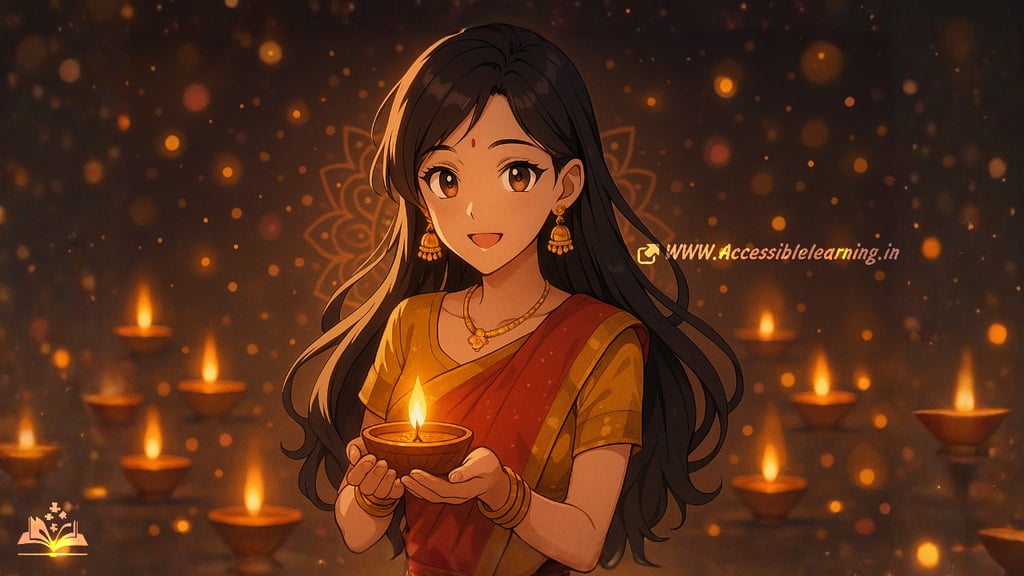
Diwali / Deepavali – Festival of Lights, History, Significance & Traditions
Discover the true meaning of Diwali / Deepavali, the Festival of Lights. Explore its history, mythological origins, five-day celebrations, global traditions, and modern relevance. Learn why Diwali symbolizes the victory of light over darkness and good over evil.
CULTURE/TRADITIONINDIA/BHARATCELEBRATION/FESTIVALS
Keshav Jha
10/14/20253 min read


Diwali, also known as Deepavali (from the Sanskrit words "Deepa," meaning "lamp," and "Avali," meaning "row"), is one of the most celebrated and spiritually significant festivals in India and across the world. Symbolizing the victory of light over darkness, knowledge over ignorance, and good over evil, Diwali transcends religious boundaries and unites millions of people through joy, tradition, and togetherness.
The Origins and Mythological Significance of Diwali
The stories associated with Diwali vary across regions and cultures, but they share a common thread of hope, renewal, and triumph:
Return of Ram Ji: In North India, Diwali marks the return of Ram Ji to Ayodhya after a 14-year exile and his victory over Ravan. The people welcomed him with lamps, giving birth to the tradition of lighting diyas.
Maa Lakshmi’s Birth: In many traditions, Diwali is associated with Maa Lakshmi, the deity of wealth and prosperity, believed to have emerged from the cosmic ocean during Samudra Manthan (churning of the ocean).
Krishna Ji and Narakasura: In South India, it is linked with Krishna Ji’s victory over the demon Narakasura, symbolizing the end of cruelty and darkness.
Guru Hargobind Ji’s Release: In Sikhism, Diwali is celebrated as Bandi Chhor Divas, marking the release of Guru Hargobind Ji from captivity.
Mahavira’s Enlightenment: For Jains, Diwali commemorates Mahavira Ji’s attainment of moksha (liberation).
Thus, Diwali is not just a festival—it is a spiritual milestone with layered meanings across cultures.
The Five Days of Diwali Celebration
Diwali is not just a one-day festival but a five-day celebration, each day holding special significance:
Dhanteras—The first day marks prosperity and health. People clean their homes, buy gold, silver, or utensils, and worship Dhanvantari Ji (the God of Ayurveda and health).
Naraka Chaturdashi (Choti Diwali)—Symbolizing the destruction of evil, this day is associated with Lord Krishna’s victory over Narakasura. Traditionally, people light lamps and burst crackers.
Lakshmi Puja (Main Diwali Day)—The most significant day when families worship Maa Lakshmi and Ganesha Ji, light diyas, decorate homes with rangoli, and exchange sweets.
Govardhan Puja / Annakut—Celebrated as the day Krishna Ji lifted the Govardhan Hill to protect villagers, people prepare offerings of food and express gratitude to nature.
Bhai Dooj—A day dedicated to the bond of siblings, where sisters pray for their brothers’ well-being and brothers give gifts in return.
Traditions and Practices of Diwali
Lighting Diyas & Candles: Symbolizing the victory of light over darkness, homes are illuminated with clay lamps, candles, and modern fairy lights.
Rangoli Designs: Colorful rangoli patterns adorn entrances, believed to welcome Maa Lakshmi and spread positivity.
Firecrackers: Though controversial today due to environmental concerns, bursting crackers was historically seen as a way to ward off evil spirits.
Sweets & Feasting: Diwali is incomplete without exchanging traditional sweets like laddoos, barfi, and halwa, fostering community and bonding.
Gifting: Families and businesses exchange gifts, symbolizing goodwill and prosperity.

Regional Variations of Diwali in India
North India: Strongly tied to Ram Ji’s return; emphasis on Ramayana-themed rituals.
South India: Known as Deepavali, celebrated early in the morning with oil baths and special sweets.
West India (Gujarat, Maharashtra): Associated with Lakshmi Puja and the New Year (Bestu Varas in Gujarat).
East India (West Bengal, Odisha, Assam): Focus on Kali Puja, where Mata Kali is worshipped with devotion.
Global Celebrations of Diwali
Diwali is not confined to India. It is celebrated by the Indian diaspora worldwide in countries like Nepal, Sri Lanka, Singapore, Malaysia, Fiji, Mauritius, South Africa, Trinidad, Guyana, the UK, the US, and Canada. In 2021, even the White House in the USA hosted Diwali celebrations, reflecting its universal appeal as a cultural and spiritual festival.
The Modern Relevance of Diwali
Spiritual Renewal: Beyond rituals, Diwali is a reminder to cleanse the heart and mind from negativity.
Sustainability: In modern times, eco-friendly Diwali practices are gaining importance—using biodegradable diyas, reducing firecracker use, and promoting green celebrations.
Economic Impact: Diwali is a major economic driver in India, often compared to Black Friday in the West, as people purchase gifts, clothes, jewelry, and electronics.
FAQs
Q: Why is Diwali called the Festival of Lights?
Because it involves lighting diyas, candles, and lamps that symbolize the victory of light over darkness and hope over despair.
Q: How long does Diwali last?
Traditionally, Diwali is celebrated over five days, though the main day (Lakshmi Puja) is considered the highlight.
Q: Which God and Goddess are worshipped on Diwali?
Primarily, Maa Lakshmi (wealth and prosperity) and Ganesha Ji (remover of obstacles) are worshipped.
Q: Is Diwali a Hindu-only festival?
No, it is celebrated across Hindu, Sikh, Jain, and some Buddhist traditions and culturally embraced worldwide.
Q: When is Diwali celebrated?
Diwali is celebrated on the Amavasya (new moon night) of the Hindu month of Kartika, usually falling in October or November.
Diwali, or Deepavali, is much more than a festival—it is a timeless celebration of life, harmony, and renewal. It reminds us that light always triumphs over darkness, whether in mythology, history, or our personal lives. While traditions may evolve with time, the essence of Diwali continues to inspire billions across the world.
Subscribe To Our Newsletter
All © Copyright reserved by Accessible-Learning Hub
| Terms & Conditions
Knowledge is power. Learn with Us. 📚


